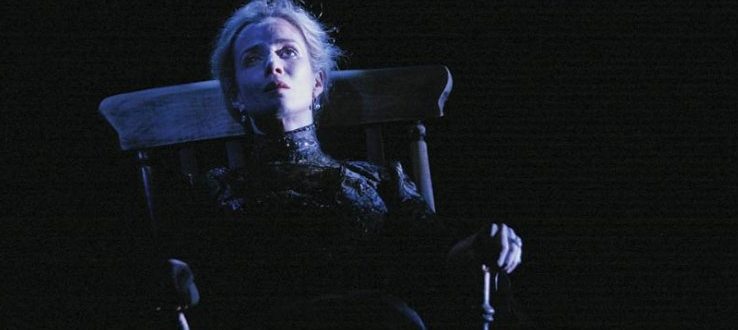Lisa Dwan’s Beckett triptych is a harrowing masterclass in dramatic minimalism.
Studio Underground, State Theatre Centre of WA, Perth
February 14, 2015
An hour in a black box delving inside the minds of three traumatised women is perhaps not how I might have envisaged spending my Valentine’s Day, but Lisa Dwan’s harrowing, haunting trilogy of Samuel Beckett shorts is one of the most powerful pieces of drama I think I’ve ever come across.
Written between 1973 and 1981, and all either premiered, or made her own, by the late Billie Whitelaw, Not I, Footfalls and Rockaby make perfect bedfellows, the latter pair a particularly apposite segue. For this immaculately authentic production from London’s Royal Court Theatre, directed by Walter Asmus – a long-time friend and collaborator of Beckett – Irish actor Lisa Dwan was mentored by Whitelaw itself. But all of that would be as nothing if Dwan didn’t take these three searingly painful works and make them entirely her own.
The first, Not I, is perhaps technically the most difficult. A ten-minute stream of consciousness poured forth from a pin-spotted, disembodied mouth, the monologue is essentially the jumbled recollections of a 70-year-old woman recalling her birth, abandonment and subsequent traumatic life in the light of “it”, a never specified terrible event (Beckett always denied it was a rape yet there are violent sexual references), which one presumes has lodged at the heart of her painful, pitiful existence. The “it” has affected her brain and damned up her ability to communicate for a large part of her life, which partially explains the higgledy-piggledy outpouring, delivered, as Beckett instructs, at the speed of thought.
Dwan delivers it all with remarkable precision, her Irish brogue giving the poetry a lyrical rise and fall that elevates it to the proportions of an operatic monologue. Extruded words like “haaalf”, and “waay” offer momentary pauses in the flow of the tirade, as do questionings and answers like the oft repeated “What? – no, she!” There are, of course, no answers, and as the mouth fades out in an incoherent gibbering, the audience are given three uncomfortable minutes to sit in the pitch black and contemplate this woman’s lonely existence.
That loneliness only intensifies in Footfalls, a duologue for another woman and her unseen mother that initially appears to be taking place as the former paces incessantly outside the room in which the latter would seem to be dying. Voicing both roles, Dwan cuts a tragic, gothic, Miss Haversham-like figure as the ghostly May in her faded gown. As the endless sequence of “nine steps and wheel” repeats again and again the two women play out a fearsome game of half-remembered cat and mouse. May, with vainly supressed loathing, offers to dress her mother’s sores. Mother enquires “will you never have done, revolving it all”.
Again, that “it” is never revealed and, in the end, a temporal sleight of hand leaves you wondering if either mother or May might have been dead all along. Either way, May seems condemned to walk this hall for eternity, her footsteps echoing on the floor whose carpet she had removed since, through a desperate desire for a sense of her own existence, she needed to “hear the feet, however faint they fall”. Masterly in her sepulchral stillness as much as in her movement, Dwan’s May haunted my thoughts long after the performance ended.

Finally, the most famous or the triptych, Rockaby, finds Dwan as a prematurely old woman buttoned up to the neck and sitting in a wooden chair that rocks of its own accord. A written work of genius, Beckett’s use of speech rhythms reflects the perpetuum mobile of the woman’s endlessly revolving brain as she meanders back and forth, yet heads gradually and inexorably towards the point of no return. Those thoughts move step by step from her mother’s death (probably in the same house and, macabrely, possibly wearing the same clothes), to the desperate need to see another living sole through the upper story window, to a gradual move downstairs and the decline toward oblivion.
For anyone who has experienced an elderly relative slipping into incoherence, Dwan’s performance will ring an all too familiar bell. As she rocks to a pre-recorded soundtrack, the only vocalisations are her wretched exclamations of “more” – ambiguously either a feeble demand for further life or disbelief that she must endure another day. It’s deep, dark and utterly heart-breaking. This is theatre at its most demanding, harrowing and compelling. Do see it.
Not I, Footfalls, Rockaby is at State Theatre of WA until February 20.











Comments
Log in to join the conversation.